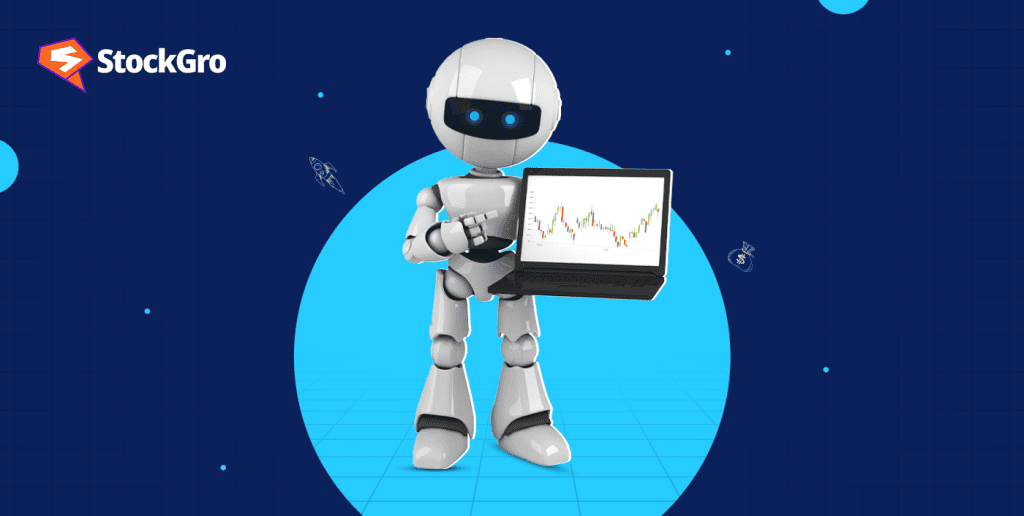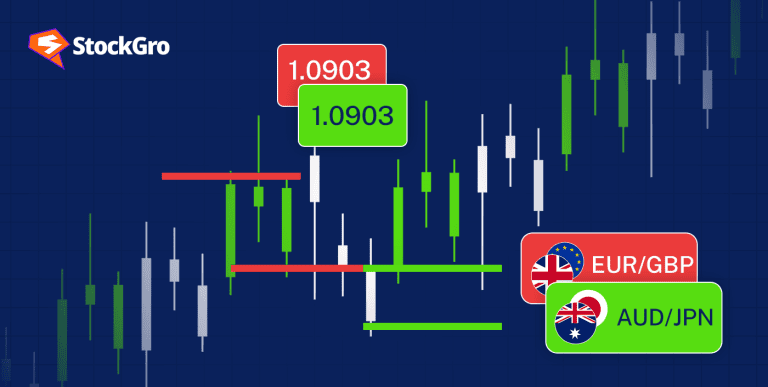
Ever missed a good trade since you reacted too slowly? Every second counts in the hectic world of intraday trading, and occasionally, the difference between winning and losing trade can be as rapid as a few minutes.
Here is where robo trading finds applications. Without your continual attention, a robo order, an automated trading instruction, execute your buy or sell decisions depending on predetermined criteria.
Rapid changes in the market mean that manually running trades can result in emotional decisions or lost possibilities. Robo orders automate your approach so that transactions are carried out instantly following your guidelines, removing this wait. Including robo orders into your trading schedule will help you improve risk management, lower emotional bias, and enhance your decision-making process.
Also read: Intraday Trading Explained: How It Works and Its Benefits
What are robo orders?
An automatic trade instruction called a robo order runs your buy or sell orders depending on predefined criteria without your direct participation. Once the settings are set, the system runs over to guarantee the deal is carried out precisely as intended at the correct moment.
Usually using robo orders to specify stop-loss levels, entry and exit points, or trailing stops, traders A trader might create a robo order, for instance, to automatically make a purchase when the price of a stock increases above ₹1,000. To further reduce possible losses, traders can establish a stop-loss, which will instantly sell a stock if its price drops to a specific threshold.
Suppose you are following a stock that right now costs ₹600. To guard your investment, you configured a bot order to sell it should the price fall below 500. Once the price drops to ₹500, the robo order will automatically carry out the sale, therefore sparing you from constantly monitoring the market. Even in cases where you are not actively observing the market, this automation enables you to follow your plan and respond fast.
Also read: Best Robotics Stocks for 2025
Key benefits of robo orders in intraday trading
- Speed and accuracy:
In intraday trading, where prices may change quickly, trading bots let traders react immediately to market movements, a vital benefit. Automating deals helps traders avoid missing out on profitable prospects because of slow reactions.
A robo order can do the deal right away, locking in gains or reducing losses before the market moves further, should the price of a stock unexpectedly surge or fall.
- Remove emotions from trading:
Making emotional decisions while intraday trading presents one of the most formidable difficulties. Robo instructions can eliminate feelings like greed and fear, which can drive rash judgements and losses.
A trader might, for instance, panic and sell a stock too early after a dip only to see it recover shortly afterwards. Following a robo order guarantees consistent judgements in line with the trader’s predefined strategy free from emotional intervention.
- Consistency:
Robo orders guarantee that your trading approach is carried out in the same manner every time, minimising human error. Once your criteria have been established, you can be sure the system will regularly operate on them independent of transaction volume.
Knowing each trade matches their plan exactly, a trader employing robo orders during the morning session can execute several trades across many stocks without constantly monitoring the market.
You may also like: Best intraday trading strategies for beginners
How robo orders help with risk management
Suitable intraday trading depends critically on risk management. Robo orders, also called algorithmic or automated orders, can significantly improve risk management in the following respects:
- Setting precise stop-loss orders: Robo orders let traders create exact stop-loss levels, which are automatically carried out when the price passes a specific point. This guarantees minimised losses and helps to avoid emotional decisions made during market volatility. For instance, the robo order will automatically sell a stock should its price drop to a predefined threshold, reducing any losses.
- Automating take-profit levels: Apart from stop-loss rules, robo orders can automatically control take-profit levels. The robo order will thus carry out the sale to lock in gains when a stock reaches a designated profit threshold. This strategy enables traders to guarantee gains without always watching the market.
- Consistent risk-reward ratios: Robo orders guarantee that transactions are carried out based on established criteria, therefore helping to preserve constant risk-reward ratios. Each trade can have specific criteria defined by traders, such as 2:1 reward-to-risk ratio; the robo order will thus naturally follow these rules. Success in long-term trading depends critically on consistency.
- Reducing human error: Emotional influences, tiredness, and distraction all contribute to mistakes in manual trading. Robo orders run transactions according to algorithms and set rules, thus removing these elements. It guarantees that trading is done as intended and lowers the possibility of errors.
- Adapting to market conditions: Using sophisticated algorithms and real-time data processing, advanced robo orders can change with the times and fit the market. These orders provide a flexible risk management solution that reacts to market changes by dynamically changing stop-loss and take-profit levels.
- Diversifying trading strategies: Robo orders let traders simultaneously apply several trading techniques, distributing risk among several assets and market situations. Through diversification of their strategy, traders can lower the effect of negative moves in a single market or asset, thus improving general risk control.
Must read: Risk tolerance: Defining your personal investment strategy and portfolio
Common pitfalls to avoid with robo orders
Although robo orders help to simplify your trading, you should not rely too much on them. “Just because it’s automated doesn’t mean it’s foolproof.” Automated trading should enhance rather than totally replace your approach. Review your trading plan often and modify your settings to match the state of the market.
Moreover, robo orders can suffer in highly volatile markets or during flash crashes, two extremes. Under these conditions, orders might not go as planned; therefore, missing possibilities or unanticipated losses could result. For example, a stop-loss order placed during a volatile period might not be executed at the intended price.
Bottomline
For intraday traders, robo orders provide speed, accuracy, and improved risk control, among other benefits. Automating your entry and exit points can help you reduce emotional decision-making and react immediately to market developments. Robo orders also minimise human mistakes by helping to guarantee the consistent application of your trading plan.
In the fast-paced realm of intraday trading, robo orders can be the instrument providing the edge you have been yearning for. Using automation to handle your trades allows you to concentrate on strategy instead of becoming mired in the quick-paced market.
FAQs
Which order type is best for intraday trading?
Market orders’ speed and effectiveness make them the ideal option for intraday trading. They guarantee speedy execution by letting traders purchase or sell right at the current market price. In the hectic world of intraday trading, where values shift quickly, this is absolutely vital. To control risk and guard against major losses, traders should also give stop-loss orders some thought.
Can intraday trading be automated?
Yes, trading bots or robo orders let intraday trading be automated. These instruments guarantee fast and precise trades by running buy and sell orders depending on set criteria. Automation helps to control risks, lower emotional biases, and preserve constant trading practices by means of competent management. Using sophisticated algorithms helps traders react quickly to changes in the market, therefore improving their general trading effectiveness and efficiency.
Is robo order only for intraday?
No, robo orders span more than just intraday trading. Among the several trading techniques they can be applied are swing trading and long-term investments. Robo orders are flexible instruments for many trading approaches since they automate buy and sell decisions depending on pre-defined parameters. Regardless of the trading time span, they enable traders to control risk, run transactions effectively, and lower emotional prejudices.
Is robo trading safe?
Under proper use, robo trading can be safe. Based on established criteria, it automates trades, therefore lowering emotional prejudices and human mistakes. Still, as market conditions can change quickly, settings must be routinely watched over and changed. Unexpected losses can result from depending too much on automation without knowing the underlying strategy. Safe and successful robo trading depends on good risk control and ongoing supervision.
Is it illegal to automate day trading?
Although day trading automation is usually lawful, it must follow rules to guarantee fair trading methods and stop market manipulation. For instance, the Securities and Exchange Board of India (SEBI) enables algorithmic trading but sets tight policies and conducts audits in India. Traders have to make sure their automated systems follow these guidelines to stay out of legal hot ground. Before starting automatic trading plans, always review local rules.

